Products
Featured products from the spectroscopy marketplace.
Powder database
ICDD's PDF-4+ 2007 collection of inorganic powder patterns features 272,232 data sets. According to the company, the database is a tool for phase identification using physical, chemical, and crystallographic data and features electron diffraction simulations based upon atomic structure and electron diffraction scattering factors on over 172,000 data sets. International Centre for Diffraction Data, Newtown Square, PA; www.icdd.com
Circle 100
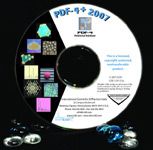
Freezer/mill
The SPEX SamplePrep 6870 Freezer/Mill is designed to embrittle samples by immersing them into liquid nitrogen and then pulverizing them with a magnetically driven impactor. According to the company, applications include DNA and RNA extraction, skeletal material, trace-element analysis, screening of asbestos-containing materials, pharmaceutical research, and diffraction studies of soft materials. SPEX SamplePrep LLC, Metuchen, NJ; www.spexcsp.com
Circle 101
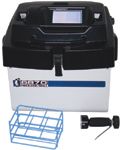
OEM CCD spectrometers
OEM miniature CCD spectrometers from Horiba Jobin Yvon are available for Hamamatsu back-thinned CCDs, such as the S9840 and the S7031, as well as for the E2V CCD-30 family. According to the company, compact spectrometers can be customized for a variety of OEM applications in fields such as analytical chemistry, medical analysis, and semiconductor manufacturing. Horiba Jobin Yvon, Edison, NJ; www.jobinyvon.com
Circle 102
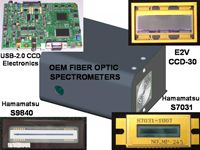
UV-vis spectrophotometer
Hitachi's model U-2900 is a UV-vis local control double-beam spectrophotometer designed for routine as well as research laboratory applications. According to the company, the product is equipped with a 10.4-in. color liquid crystal display, data storage with an external USB flash disk, a validation function that allows users to check performance, and optional PC control using the company's UV Solutions software. Hitachi High Technologies America, San Jose, CA; www.hitachi-hta.com
Circle 103
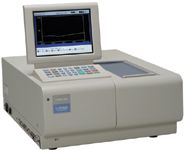
X-ray system
X-Ray Optical's X-Beam Powerflux PF integrated X-ray beam system is an air-cooled X-ray source coupled to a focusing polycapillary optic, and a high voltage power supply with controller. According to the company, the system's active source control (ASC) feature delivers stability over temperature fluctuations and at varying power settings. X-ray Optical, East Greenbush, NY; www.xos.com
Circle 104
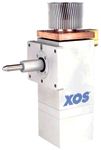
Portable XRF analyzer
Innov-X Systems introduces the Alpha LZX portable XRF analyzer, which is designed to measure Mg, Al, Si, and over 25 other elements simultaneously in alloys, powders, ores, liquids, and other matrices. According to the company, the analyzer requires no helium gas, compressed tanks, or vacuum pumps. Innov-X Systems, Woburn, MA; www.innov-xsys.com
Circle 105
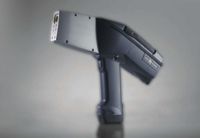
XRF detector
Amptek offers its XR-100CR XRF detectors, featuring 149-eV resolution, thermoelectric cooler, small size, and solid-state design, as both complete systems and to OEMs. According to the company, it does not use liquid nitrogen and is suitable for portable applications such as measuring plating thickness; lead detection; RoHS/WEEE verification; semiconductor processing, and sulfur in oil and coal. Amptek, Inc., Bedford, MA; www.amptek.com
Circle 106

Elemental analyzer
The Eagle III XPL micro-EDXRF spectrometer from EDAX is now available with an optional primary-beam-filter accessory that reportedly improves detection limits. The spectrometer uses capillary optics, CCD video imaging cameras, and a motorized xyz stage for nondestructive small-spot analysis correlated with video imaging. Features include simultaneous detection of elements ranging from Na through U, and little or no sample preparation requirements. Typical applications include forensics, failure analysis, coating thickness-composition measurement, quality control, and chemical imaging. EDAX, Mahwah, NJ; www.edax.com/
Circle 107
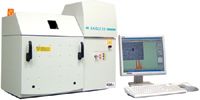
Mass spectrometer
Bruker Daltonics announces its ultraflex III smartbeam MALDI-TOF-TOF mass spectrometer, optimized for MALDI molecular imaging. The product is designed to produce a laser focus size of 10–80 μm, with adjustable repetition rates from 1 Hz to 200 Hz. Bruker Optics, Billerica, MA; www.brukeroptics.com
Circle 108
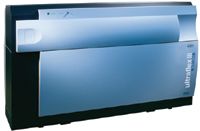
Reflectance accessories
Thermo Fisher Scientific's specular reflectance accessories are designed to complement the company's Evolution 300 and 600 UV-vis spectrophotometers. The fixed- and variable-angle accessories are intended to provide a wide range of capabilities for material science laboratories interested in measuring the specular reflectance of solid materials with mirror-like or glossy surfaces. Thermo Fisher Scientific, Inc., Waltham, MA; www.thermo.com/sra
Circle 109
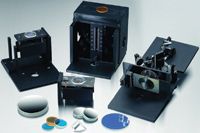
Analyzer
Jordan Valley's RoHS MicroAnalyzer is designed to determine the precise level of restricted substances in components. The analyzer uses a high resolution detector, an integrated CCD camera, and an X-ray tube with variable spot size to accommodate large and small samples to measure low levels of Cd, Pb, Hg, Br, and Cr in alloys, plastics, circuit boards, resins, coatings, and packaging materials. Jordan Valley, Austin, TX; www.jordanvalley.com
Circle 110
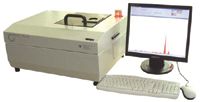
UV-Vis-NIR spectrometer
The MCS 600 spectrometer from Carl Zeiss is designed to allow different UV-Vis-NIR spectrometers to be combined, covering the spectral range from 190–2150 nm, and simultaneously record high-quality spectra from myriad spectral regions, multiple probes, and external sensors. Carl Zeiss MicroImaging, Thornwood, NY; www.zeiss.com
Circle 111
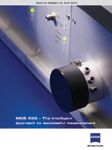
X-ray detector
PANalytical introduces the PIXcel solid-state detector designed for XRD applications. According to the company, the detector contains more than 65,000 pixels, each 55 μm × 55 μm in size. The detector can be mounted as one of the company's PreFIX interchangeable X-ray modules or positioned behind conventional point detector optics. PANalytical, Almelo, The Netherlands; www.panalytical.com
Circle 112
Spectroscopy software
Thermo Fisher Scientific's GRAMS 8.0 software is designed for visualizing, processing, and managing data from FT-IR, NIR, Raman, UV-vis, fluorescence, NMR, and hyphenated instruments. According to the company, the software enhances workgroup and enterprise connectivity via a full client/server update to Spectral DB, and includes the web-enabled Envision viewing and reporting feature. Thermo Fisher Scientific, Waltham, MA; www.thermofisher.com
Circle 113
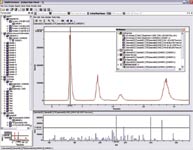
Cuvette
The TrayCell cuvette from Hellma reportedly uses the surface tension of 4 μL of sample to form a repeatable optical path of 1 mm ± 0.02 mm. According to the company, it is compatible with most spectrophotometers, operates at temperatures ranging from 5 °C to 50 °C, and has a wavelength range of 190–800 nm. Applications include biotechnology, drug discovery, and forensics. Hellma, Plainview, NY; ww.hellmaUSA.com
Circle 114

Magnetic resonance spectrometer
Varian introduces its model 400-MR magnetic resonance spectrometer, which is designed to give nonspecialists access to state-of-the-art methods for molecular characterization and quantitation. According to the company, the NMR spectrometer's compact footprint makes it easier to accommodate in small analytical laboratories in pharmaceutical, biotech, chemical, and academic environments. Varian, Inc., Palo Alto, CA; www.varianinc.com
Circle 115
Raman spectrometers
The MonoVista CRS and the TriVista CRS Confocal Raman systems from PI/Acton are designed to offer both macro and confocal microanalysis capabilities in a single system, enhancing experimental flexibility and allowing switching between macro and micro modes. The company states that the integrated modular systems provide instant results and easy configuration for multiple applications, with integrated laser options available. PI/Acton, Trenton, NJ; www.piacton.com
Circle 116
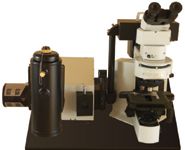
XRF microscope
Horiba Jobin Yvon's XGT 7000 X-ray fluorescence microscope reportedly features improved sensitivity, motorized XYZ control, multiple vacuum options, and a dedicated acquisition and imaging analysis software package. According to the company, the microscope enables concentrations of 50 ppm or less to be routinely detected and quantified. HORIBA Jobin Yvon, Edison, NJ; www.jobinyvon.com
Circle 117
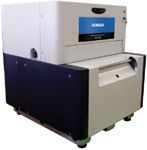
Electron-Multiplied CCD camera
Andor's Luca R EMCCD camera is reportedly ideal for fluorescence microscopy across a range of signal levels. According to the company, the camera utilizes a monochrome 1-megapixel frame transfer EMCCD sensor, providing single-photon detection sensitivity and unrestrained QE up to 65% at rapid frame rates, in a TE cooled, compact, USB 2.0 camera platform. Andor Technology, South Windsor, CT; www.andor.com
Circle 118
Multimode optical fiber
Fiberguide Industries manufactures the Hard Optical Polymer Clad multimode fiber, which features a high numerical aperture and a high core-to-clad ratio for use in UV-Vis and Vis-IR spectroscopy. According to the company, the hard cladding increases fiber strength and reduces static fatigue in humid environments, and also protects the fiber during buffer stripping to prevent fiber breakage. Fiberguide Industries, Stirling, NJ; www.fiberguide.com
Circle 119
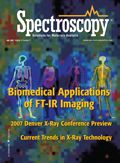
Real-Time Battery Health Tracking Using Fiber-Optic Sensors
April 9th 2025A new study by researchers from Palo Alto Research Center (PARC, a Xerox Company) and LG Chem Power presents a novel method for real-time battery monitoring using embedded fiber-optic sensors. This approach enhances state-of-charge (SOC) and state-of-health (SOH) estimations, potentially improving the efficiency and lifespan of lithium-ion batteries in electric vehicles (xEVs).
Smart Optical Sensors for Thermal Management in Electric Vehicles
April 8th 2025A recent review in Energies explores the latest advancements in sensor applications for electric vehicle (EV) thermal management systems. The study, authored by Anyu Cheng, Yi Xin, Hang Wu, Lixin Yang, and Banghuai Deng from Chongqing University of Posts and Telecommunications, along with industry partners, examines how advanced optical sensors improve the efficiency, safety, and longevity of EVs.